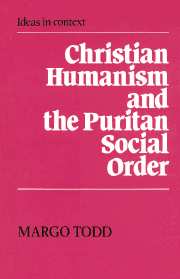Book contents
- Frontmatter
- Contents
- preface
- Abbreviations
- 1 Introduction: The demythologizing of puritanism
- 2 Christian humanism as social ideology
- 3 The transmission of Christian humanist ideas
- 4 The spiritualized household
- 5 Work, wealth and welfare
- 6 Conscience and the Great Chain of Being
- 7 The conservative reaction: Trent, Lambeth and the demise of the humanist consensus
- Bibliography
- Index
2 - Christian humanism as social ideology
Published online by Cambridge University Press: 06 July 2010
- Frontmatter
- Contents
- preface
- Abbreviations
- 1 Introduction: The demythologizing of puritanism
- 2 Christian humanism as social ideology
- 3 The transmission of Christian humanist ideas
- 4 The spiritualized household
- 5 Work, wealth and welfare
- 6 Conscience and the Great Chain of Being
- 7 The conservative reaction: Trent, Lambeth and the demise of the humanist consensus
- Bibliography
- Index
Summary
The humanist social ethic which puritans would find so attractive was biblical in its apologetic, eclectic in its sources, mundane in its concerns but religious in its goals, practical in its methodology, and activist in its approach. It was a distinctively Christian humanism, aimed at formulating a model for godly behavior which would apply equally to prince and commoner, clergy and laity. The moral reconstruction of the social order was its ultimate objective– and its supreme attraction for protestant reformers.
For humanists, both Italian and transalpine, a disdain for ecclesiastical corruption had combined with a veneration of ancient literature and the society which had produced it to bring forth a new conception of human potential, social as well as individual. Christendom, they agreed, had a bad track record as compared with the intellectual, political and social achievements of ancient civilization. In the Renaissance view, both Roman Stoics and primitive Christians evinced more purity of life and a more godly social and political ethic than the despised medieval church had been able to achieve. Humanists accordingly divided their time between satirizing their own immediate social and intellectual milieu and reviving a true knowledge of the Greco-Roman and patristic Golden Age. The centuries between St Augustine and their own day were, in Renaissance minds, uniformly dark, barbaric and intellectually stagnant. The brilliance of the medieval schoolmen was among the casualties of this not altogether enlightened perspective; however, we must remember that the scholasticism of Erasmus’ Paris was in fact a far cry from that of St Thomas.
- Type
- Chapter
- Information
- Christian Humanism and the Puritan Social Order , pp. 22 - 52Publisher: Cambridge University PressPrint publication year: 1988

